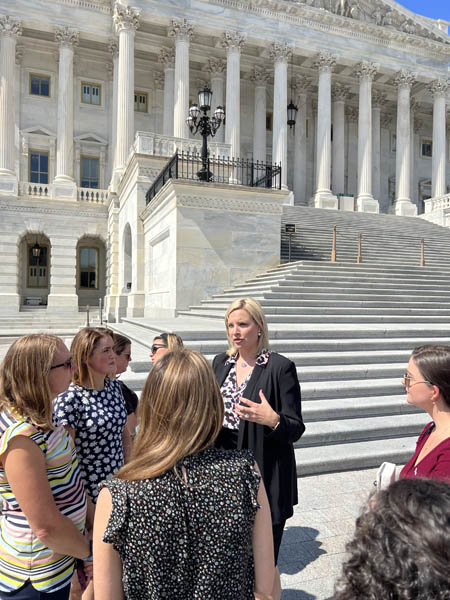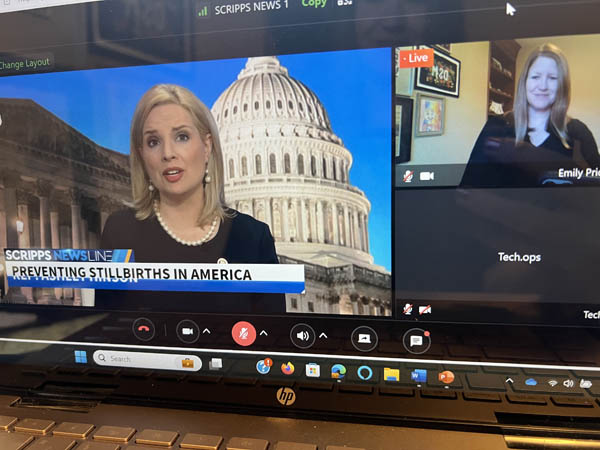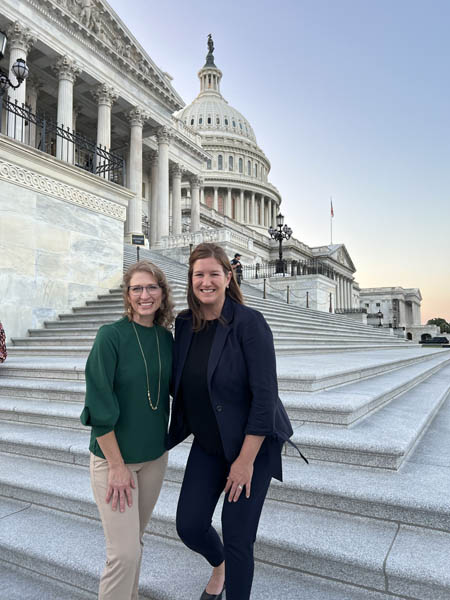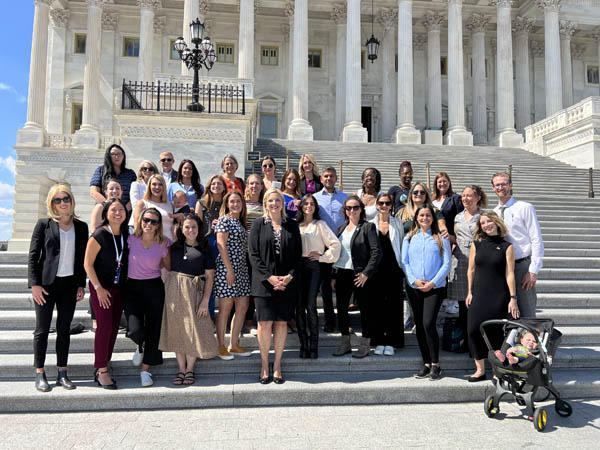Iowa-Led Stillbirth Prevention Bill Passes U.S. House Shortly After DMDC Trip
Just five days after this year’s Greater Des Moines Partnership trip to D.C., legislation sparked right here in Des Moines passed the U.S. House of Representatives on a vote of 408-3. The bipartisan Maternal and Child Health Stillbirth Prevention Act of 2024, led by Rep. Ashley Hinson (R-IA) and Rep. Alma Adams (D-NC), was initiated by our Des Moines-based nonprofit organization Healthy Birth Day, Inc. The bill is an essential part of an effort to get all 50 states on a path to reduce their stillbirth rates to the same levels our state has seen — a promising 32% reduction in Iowa’s stillbirth rate in a decade.

The deafening silence of a baby born still (the loss of a baby at 20 weeks or greater gestation during pregnancy) echoes throughout hospitals in our country 65 times every single day. Stillbirth is a public health crisis, with more than 21,000 babies born still every year in the United States. The annual number of stillbirths far exceeds the top five leading causes of death among children ages 0-14 years combined, including unintentional injuries, congenital anomalies, preterm birth, homicide, SIDS and heart disease, according to National Vital Statistics
.
Advocating for the Maternal and Child Health Stillbirth Act
Our team has spent the past 2+ years traveling to D.C. with advocates from Iowa and across the country to help elevate the stillbirth crisis while asking Congress to make meaningful change. We started timing some of our trips to coincide with The Partnership’s annual DMDC trip because of the unmatched access to Iowa’s delegation and their health care staffers. The trip also includes many of our corporate and health partners who care deeply about this issue.
I can remember having tears in my eyes during one rooftop reception while speaking personally with Senator Grassley’s health staffer Nic Pottebaum and our Director of Advocacy and Engagement Jen Rowray about the impact of stillbirth on families. Other trips found us on the House steps as Congresswoman Hinson graciously spent time with each loss mom who had come to share her own personal heartbreak. Congressman Nunn spoke about the stillbirth crisis on the House floor during last year’s DMDC visit. Every member of the Iowa delegation supports the Maternal and Child Health Stillbirth Prevention Act.
More times than I can count, members of Congress or their staff would tell us how stillbirth had impacted their own families and friends. We had one Congressman overhear our conversations about heartbreak and loss and walk out of his office to tell our advocates, “I lost a daughter to stillbirth 30 years ago. I’ve never spoken about it until now.” It was in these moments that we saw change coming.
This legislation can immediately unleash existing Title V Block Grant funds to prevent stillbirth, an outcome happening to one in every 175 pregnancies in the U.S. Title V is the single largest funding mechanism to support maternal and child health issues in the United States. This bipartisan legislation would add stillbirth and stillbirth prevention to Title V — something that has been lacking since the introduction of Title V funding back in 1935.

Our organization believes stillbirth was left off back then because of the outdated belief that “stillbirths just happen.” But now we know better, and we must do better. Recent reports and data suggest that further reduction in the incidence of stillbirth is possible, highlighting that nearly 25% of stillbirths are potentially preventable. Five Greater Des Moines (DSM) women, the Founders of Healthy Birth Day, Inc., have proven that prevention is possible.
The Vital Role of Count the Kicks
In the early 2000s, Jan, Kerry, Tiffan, Janet and Kate all endured the tragedy of stillbirth or early infant death after otherwise healthy pregnancies. They were connected in their grief through mutual friends and pastors, and it wasn’t long before their pain turned into fuel, and the birth of a lifesaving stillbirth prevention program called Count the Kicks. The program is based on research out of Norway that showed a 30% reduction in stillbirth when nurses, doctors and health systems educated expectant parents on getting to know their baby’s normal movement patterns in the third trimester of pregnancy and encouraged them to speak up if they noticed a change.
Time and time again this early warning system WORKS and Count the Kicks has now saved lives in 36 states and six countries, including my son in 2010. More than 50 Iowa families so far say the program saved their baby’s life, and many of those families are from DSM. One mom, Marcedes, told us that noticing a change in her baby’s normal movement patterns was ultimately what led to her son’s safe arrival. She was familiar with Count the Kicks and began using the free app regularly once she reached the third trimester of her pregnancy with baby Carter.
“I really believe if I had not known my son’s normal kick counts and trusted myself to speak up when I was concerned that my story could have ended differently,” she said.
For Black women in our state like Marcedes, the rate of stillbirth is two times higher than it is for White women. The Count the Kicks program has shown promise in addressing racial disparities in birth outcomes. In the first 5 years of the program, the stillbirth rate for Black families in Iowa went down 39%.
This kind of systemic change only happened with the help of our Iowa health partners like MercyOne, UnityPoint, Broadlawns, University of Iowa Hospitals and Clinics, Iowa Clinic, Wellmark, Iowa Total Care, Molina Healthcare, Wellpoint and our earliest supporter, the Iowa Department of Health and Human Services.
The Maternal and Child Health Stillbirth Prevention Act provides both clarity and a vital call to action from Congress to state health departments across the nation that they can and should use a portion of the existing $2.6 billion of Title V Block Grant funding to prevent stillbirth. One way states could do this is by funding Count the Kicks in their state, which would make the bright and empowering printed educational materials available for providers to order for free. These materials help maternal health professionals facilitate conversations with expectant parents about monitoring their baby’s movements. We also offer health worker trainings, CEUs, community baby showers, kick counting wrist bands and online interactive trainings with our team.

Currently fewer than 20 state health departments are using a portion of these existing funds to address stillbirth, leaving expectant parents in most U.S. states and territories more vulnerable to stillbirth. This clarification will support stillbirth prevention activities, thereby helping to save the lives of mothers and babies.
I rushed back to D.C. just a few days after this year’s DMDC trip to see the historic vote in person. I sat in the balcony of the House chamber with one eye on the vote total and one eye on Congresswoman Hinson, who had talked about the legislation during the annual DMDC breakfast with the delegation. I cried when the overwhelming support came in, and she quietly cheered. Now it’s up to the Senate, where a companion bill already passed on unanimous consent last September.
The timing and importance of the votes is not lost on me: It was 14 years ago this week that I noticed a change in my son's movements at 30 weeks pregnant and spoke up and told my doctor. It sparked a chain of events that saved his life and changed our family (and my career) forever. I always think of our five Founders on this anniversary and how lucky I am that I knew them, and their magnificent creation Count the Kicks, which is a uniquely Iowa success story.
Our organization estimates more than 6,000 babies will be saved each year from preventable stillbirth once all 50 states adopt proven stillbirth prevention efforts. The Maternal and Child Health Stillbirth Prevention Act of 2024 now returns to the U.S. Senate for final approval so that it can be sent to the President’s desk to be signed into law. Full text of the Stillbirth Prevention Act is available at Congress.gov.
The Partnership's Public Policy team engages with local, state and federal officials to create public policy that generates economic growth, business prosperity and talent development in Greater Des Moines (DSM). Learn about state and federal legislators advocating for the region and how you can become involved by attending events like Public Policy Issue Forums and DMDC. The Partnership is a nonpartisan organization.